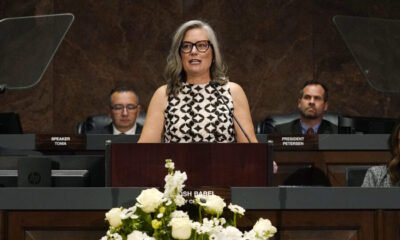Commentary
Was HB2165’s Veto a Partisan Sabotage?

In Arizona, RFK Jr.’s tenure as Secretary of Health and Human Services has sparked legislative initiatives focused on public health. During a visit in early April, he expressed support for HB2165, a proposed ban on ultra-processed foods in school lunches. This bill aims to remove sugary drinks from eligibility in the Supplemental Nutrition Assistance Program (SNAP).
Despite its intent, HB2165 met resistance and was vetoed by the Governor. The Governor argued that such a prohibition would limit the purchasing power of SNAP recipients, creating a class divide among grocery shoppers.
Critics contend this reasoning is flawed. Allowing SNAP to cover soda encourages unhealthy habits. Soda consumption is linked to rising obesity rates, with sugary drinks providing no nutritional value. Data indicates American children consume an average of 172 calories daily from these beverages, significantly increasing obesity risk.
Low-income Americans are disproportionately affected by soda consumption. Research shows that those below the poverty line are 1.7 times more likely to consume sugary drinks compared to their higher-income counterparts. This consumption pattern raises questions about the effectiveness of SNAP in promoting healthier dietary choices.
The continuation of soda purchases through SNAP not only diverts taxpayer funds but also undermines the program’s original mission: to enhance nutrition for those in need. Governor Hobbs’ objections to the bill seem contradictory given her recent ban on ultra-processed foods in schools, raising concerns about her commitment to public health.
In a state where 31.9% of adults and 55.3% of children in poverty are classified as obese, the healthcare costs associated with obesity are staggering. Arizona Medicaid spends between $962.9 million and $2.5 billion annually on obesity-related treatments.
The political landscape complicates matters. Hobbs has vetoed numerous GOP-backed bills this year, a move that aligns with her party’s strategy but potentially overlooks critical health implications. Critics argue that partisanship should not override the health needs of Arizonans.
HB2165 could have marked an important shift in SNAP regulations, steering benefits away from junk food and towards nutritional health for disadvantaged families. However, despite understanding its public health implications, Governor Hobbs chose not to advance the bill.
Peter Clark is an Arizona-based writer with contributions to various publications including AzCentral and AZ Capitol Times.


















